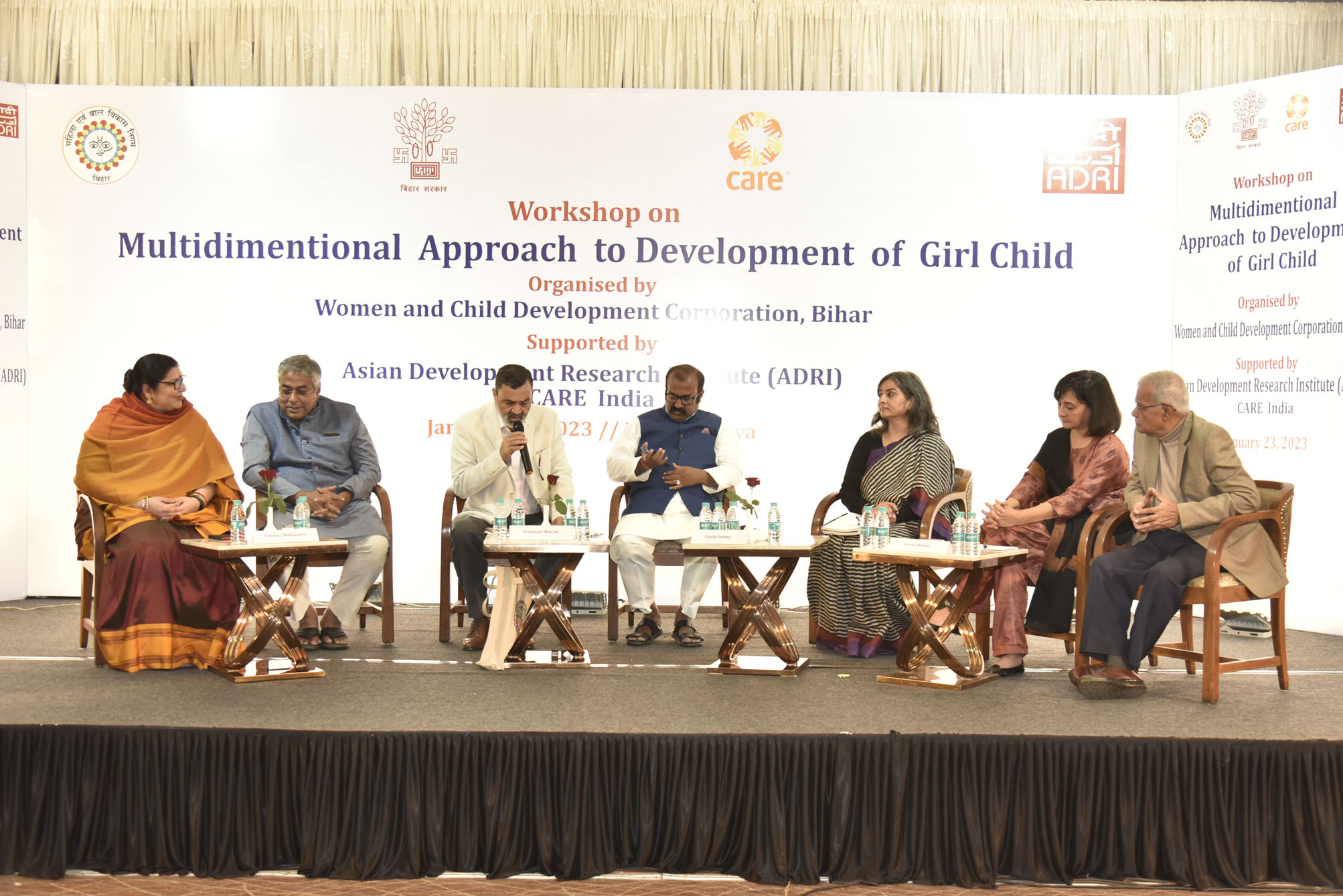Events of ADRI Patna

Concept Note: The Woman and Child Development Corporation (WDC), Bihar, the Asian Development Research Institute (ADRI) and CARE India together will conduct a one day Workshop on January 23, 2023 to celebrate the National Day of the Girl Child. January 24 is marked as the National Girl Child day and is celebrated every year across the country to spread public awareness about the inequities that girls face in the Indian society. The aim of the Workshop is to organize a multidisciplinary exercise which aims to look at the holistic development of the girl child.
“Gender Inequality exists in most parts of the world, from Japan to Morocco, from Uzbekistan to United States. Yet inequality between men and women is not the same everwhere. It can take many different forms, such as mortality, natality, basic facility, special opportunity, professional, household and ownership”, as remarked by the Nobel Laureate Amartya Sen. Consequently, achieving gender equality is one of the eight stated goals of the UN Millenium Development Goals Report. However, in order to address inequalities faced by girls, it is necessary to have a multidimentional and holistic approach that encompasses poverty, infrastructure, malnutrition, legal issues and other sources of deep rooted biases. Adopting a broad based approach helps us to target inequalities and identify policies to reduce muldimentional vulnerabilities faced by the girl child.
The Government of Bihar, under the leadership of Honourable Chief Minister Shree Nitish Kumar, has introduced several policies targeted towards girl children and women. Many of these initiatives are path-breaking, such as reservation of women in government jobs, Panchayati Raj institutions, teacher and police jobs. Ever since 2005, many policies have been introduced by the Government of Bihar in health, education, gender discriminatory norms, social protection and household infrastructure. Some of these schemes such as ’Mukhyamantri Balika Cycle Yojana’, substantially improved school attendance of girls and reduced their dropout rates by about 40 percent. Self-help groups formed under JEEViKA and Gram Varta, have led to changes in the positive direction, such as increase in asset ownership, formation of strong networks, and positive attitude towards aspirations of women.
In the last few years, the Government of Bihar has made its priorities clear by declaring Seven Resolves (Saat Nishchay 1 and 2). Many of these resolves are directly targeted towards women; for example, 35 percent reservation for women in all government jobs from 2016 onwards. There are many which are targeted towards the development of household infrastructure, such as piped drinking water for houses, electrification, and development of toilets, drainage and sewerage facilities. All these indirectly benefit women as it will reduce some of the burden of domestic work. Some of the effects of these schemes are already visible in Bihar, such as presence of a large number of females as traffic police and in police services. These have led to a changed perception that women need to be only in less physically challenging occupations. The increase of an aspirational class of women in a primarily male dominated and agrarian society can surely be attributed to some of the affirmative actions taken by the Government of Bihar.
However, Bihar still fares reasonably low in gender development indices, compared to other states. The sex ratio is 918 per 1000 which is lower than the national average. It has lower levels of female literacy and one of the lowest levels of labour force participation in the country, only 2.8 percent. It also has a high incidence of child marriage and low political representation. Many of these indicators are used to calculate the gender equality index in Sustainable Development Goals (SDG). In a recent report of the NITI Aayog, Bihar was placed right at the bottom of the ranking of SDG. How does one explain the poor gender equality indicators in spite of so many affirmative actions taken by the State Government? In order to answer this, one must keep in mind that gender related issues are not isolated and are manifestations of bigger issues, such as the nature of growth, poverty, legal dimentions, environment, malnutrition and hunger.
In this background, this Workshop aims to follow a multidimentional and holistic approach towards development of the girl child. The Workshop will have day long sessions where the resource persons will talk about the following issues that are essential to address inequalities faced by the girl child (a) Health and Nutrition, (b) Globalization, Economic Growth and Poverty, (c) Attitudes, Bias and Aspirations, (d) Legal system, and (e) Environmental changes
The Workshop will also have an interdisciplinary brainstorming session, with a focus on research evidence from across the world and particularly in Bihar. There will be a session that will try to formulate concrete policy suggestions and a roadmap for a way forward in order to have holistic development of the girl child, with special reference to Bihar. The aim of the Workshop is to bring together policy makers, researchers, practitioners and grassroot level workers and hopefully offer a fresh understanding of the problems of girl children.
Webcast Link:- Click Here